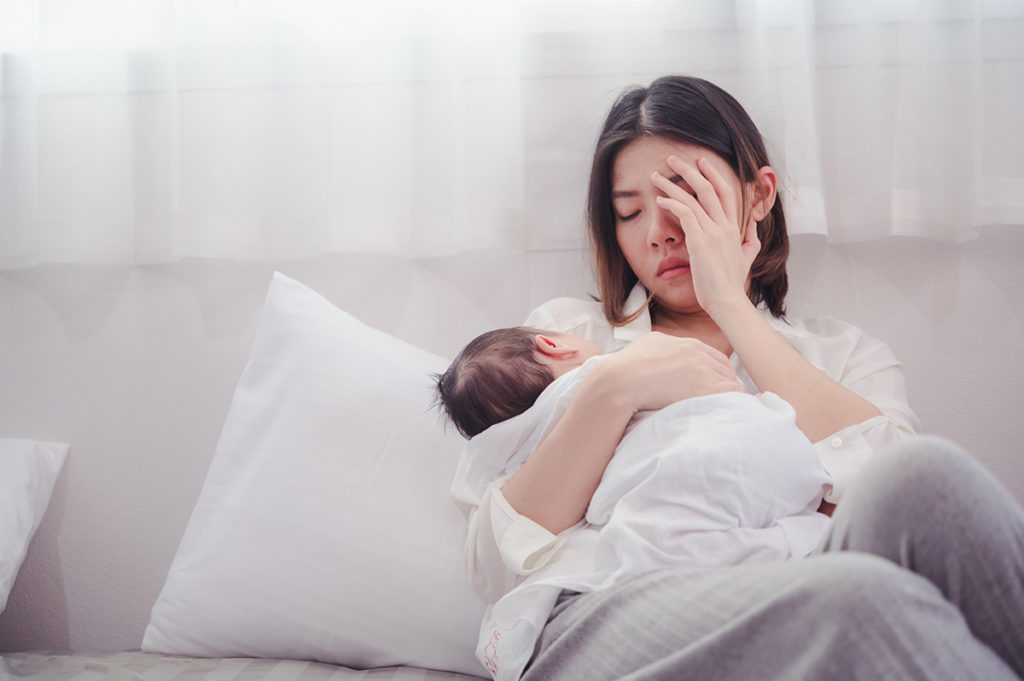Read the latest and greatest from our team
of incredible specialists.

Beach House Recovery Center » Blog » What Is Postpartum Depression?
Being a new parent should be a joyous and exciting experience, but for many people, that isn’t the case. Some women – and even occasionally men – develop symptoms of postpartum depression, a severe mental condition that can affect your ability to bond with your baby and take care of yourself.

After giving birth, the estrogen and progesterone levels in your body drop sharply, causing mood swings. Sleep deprivation and an irregular eating schedule can add to these feelings. You may also be worried about taking good care of your new baby or anxious about how your life will change now that you are a parent. All these issues can add up to the “baby blues,” a short-term condition that can affect up to 75% of new mothers. While the isolation, moodiness and sadness associated with this condition generally subside on their own after about two weeks, for some women, they do not.
Postpartum depression is a much more severe and long-lasting condition than the baby blues, affecting up to one in 10 women after delivering a baby. You may experience unexplained crying jags, fatigue, feelings of emptiness and thoughts of harming your baby or yourself. PPD can affect any woman, regardless of income, age, cultural beliefs, education level, marital status and number of pregnancies.
You may be more likely to experience PPD if you have ever struggled with mood disorders before, or if you have a family history of mental illness. New moms who lack sufficient social support, who struggle with marital conflict, who have untreated substance abuse issues or who were uncertain about their pregnancy may also be more susceptible to developing postpartum depression.
Warning signs of PPD include:
If you are currently pregnant or hoping to become pregnant and are worried about developing postpartum depression, some proactive steps might help you avoid this condition.
If left untreated, postpartum depression symptoms may get progressively worse. Some women start to imagine their loved ones would be better off without them, and sadly, suicide and accidental overdoses are leading causes of maternal death.
Remember, postpartum depression is not your fault – it is a genuine psychological disorder.
If you are having thoughts of hurting yourself or your newborn, act now. Put the baby in a safe place, like their crib or playpen. Call someone to come over and stay with you if necessary. Then, call your mental health professional or one of these free emergency hotlines:
For individuals facing both mental health crises and substance use challenges, dual-diagnosis treatment can provide integrated support to address both issues and ensure your safety and well-being.
If you are having trouble coping with a co-occurring disorder such as depression and substance abuse, addressing both issues simultaneously will put you on the path to lifelong freedom. At Beach House, we have been offering the gold standard of care to adult women and men since 2016. To learn more about our culture of clinical excellence, our resort-like environment or our client-directed approach to recovery, reach out to us today.
Whether you’re researching for yourself or a loved one, Beach House can help. We understand that this is a serious time in your life and that the treatment center you choose matters. We want you to feel comfortable and empowered to make the right decision for yourself, a friend, or a family member. This is why a counselor is waiting and available to answer your questions and help put your mind at ease regarding the next steps. Many of the staff at Beach House have walked in your shoes. If you feel you’re ready or want more information about how to help a loved one, we can help today. You can also learn why we are voted the #1 rehab for addiction treatment in Florida.
We accept most major insurance plans and can verify your benefits quickly and confidentially.
We’re committed to helping you access the care you need, our admissions counselors can guide you through your coverage options and available resources.





"*" indicates required fields